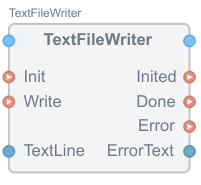TextFileWriter
TextFileWriter Usage

The TextFileWriter ServiceBlock can be used to write contents to any file. Specify the FileName and whether to Append or not. Trigger writes by sending Write events to the block. This will cause the TextLine to be written to the file. If an error occurs, the Error event is emitted (with ErrorText describing the error) and writing is aborted. When writing is successfully done, a Done event is emitted.
Events and Arguments
The TextFileWriter ServiceBlock has the following events:
| Name | Type | Description |
|---|---|---|
| Init | Input | Can be used to chain Init events / prepare the system |
| Inited | Output | Can be used to chain Init events / prepare the system |
| Write | Input | Writes the TextLine to the file. If Append is set, the TextLine is written at the end of the file, else the file is truncated and then the TextLine is written. |
| Done | Output | Emitted by the TextFileWriter when file writing is complete. |
| Error | Output | If an error occurs, this Error event is emitted, and the error text can be found in ErrorText. |
The following Arguments can be used to configure the TextFileWriter:
| Argument Name | Type | Content | Description |
|---|---|---|---|
| FileName | Input | Relative or full native path name | The file name to write to, with the optional path prefix, relative to the application folder |
| TextLine | Input | any | The text or data that should be written to the file |
| Append | Input | 0/1 | Set to 0 if you want to overwrite the content of the file, or set to 1 if you want to grow the file by appending to it for each Write event. |
| ErrorText | Output | Error text | An error-text as reported by the underlying operating system. |
See also MessageArgument, ReceiveMessage, SendMessage, DebugPrinter, Basic Block, Service Blocks, and TextFileReader.
Get started with CDP Studio today
Let us help you take your great ideas and turn them into the products your customer will love.